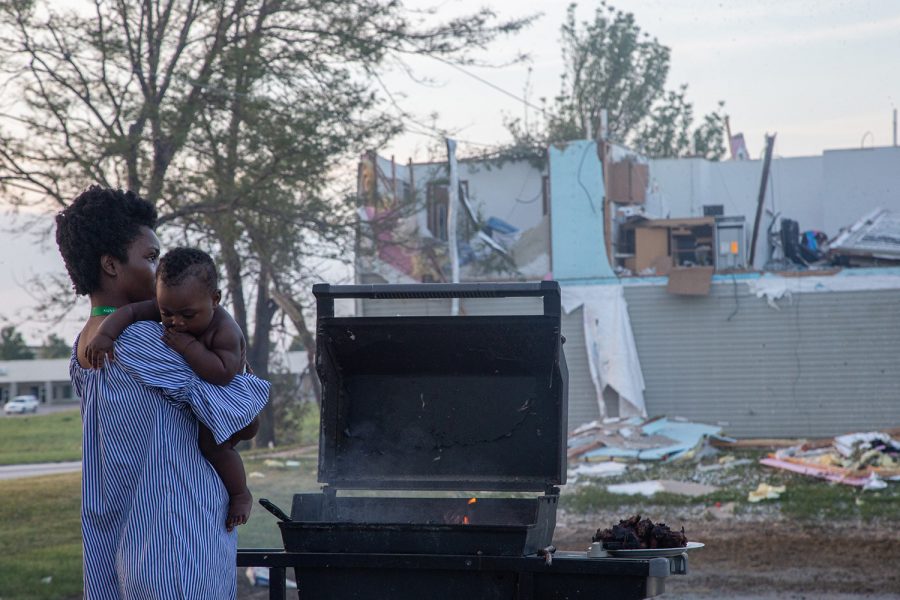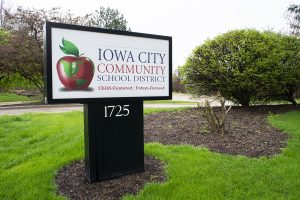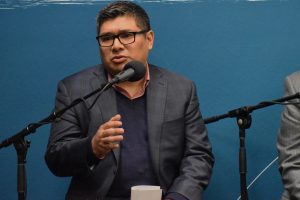After derecho, community leaders work to help migrant, refugee families
While communities across eastern Iowa are continuing to grapple with the aftermath of the storm with wind speeds matching those of a hurricane, migrant and refugee populations face heightened cultural barriers and challenges.
Sofia Saidi holds her child, Gabriel Elizabeth Bwira, while she grills dinner for her family on Thursday, August 14. She huddled with her three scared children in a corner of her apartment during the storm while her husband was at work. Like others in the apartment complex, she cooks every meal for her family like this.
September 3, 2020
The effects of the derecho that tore through eastern Iowa on Aug. 10 exacerbated struggles among migrant and refugee populations in Linn and Johnson Counties, community leaders say.
Underserved communities are typically left behind in disaster clean up due to cultural and systemic barriers that make it harder for people to access the resources they need.
Bijou Maliabo, Iowa City Human Rights Board member, and Le Ann Dunne, local advocate for the Congolese population, have been working to provide resources and assistance to migrant and refugee communities affected by the derecho.
Maliabo said her and Dunne have been serving about 58 families — over 200 people — since the storm.
Maliabo said one of the biggest challenges for these communities is the language barrier, noting that even if there are services available to them, individuals and families don’t always know how to access them.
Additionally, a lot of these populations don’t have access to adequate transportation and health care, Maliabo said.
Many of the people in these populations live in buildings and houses with severe damage, Maliabo said, noting some are still sleeping on streets and in cars.
“Some of [them] are joking as you know ‘We thought America is heaven, but we came into a refugee camp in America.’” Maliabo said.
Many of the conditions in these communities are not much different than they were four weeks ago when the derecho first hit, Dunne said.
“We just have this great disconnect between the culture…and it’s just a classic American example of being disadvantaged and not having someone to help you get a hand up,” Dunne said.
Dunne noted that in a lot of the areas where migrant and refugee populations live, the buildings still have tarps covering roofs, and a lot of the clean-up hasn’t happened.
“I really think that when you come from a disadvantaged community to begin with, you fall way down at the bottom of the totem pole when you have a disaster,” Dunne said.
Dunne said migrant and refugee populations already have to navigate within a system that is foreign to them.
“Everyday living is challenging,” Dunne said. “Now, we put this layer of this disaster on top of it…it just makes it really difficult.”
Marlén Mendoza, president of the League of United Latin American Citizens Council 308 in Iowa City, said the advocacy group has been scrambling to do what they can to help aid populations affected by the derecho in Cedar Rapids. LULAC Council 308 organized an emergency relief drive for Cedar Rapids families — asking for diapers, wipes, laundry detergent, and feminine hygiene products to be dropped off at Bribriesco Law Firm.
“[LULAC] do[es] a lot of work in our immigrant and undocumented communities,” Mendoza said. “For obvious reasons they don’t qualify for a lot of any kind of government relief especially when disaster hits like right now.”
Historically, unauthorized citizens living in the U.S. are not eligible for certain federal benefits.
Mendoza noted that many people don’t realize these communities exist in Iowa because a lot of migrant and refugee populations live in mobile homes and trailer parks, places hit hardest by the derecho.
“In Iowa it’s very easy to live your life and not see this population because they are literally hidden,” Mendoza said.
Elize Dushimimana, RefugeeRise Americorps member, said the derecho significantly impacted refugee and migrant communities in the neighborhood she serves on the Southwest side of Cedar Rapids.
“…There’s a few apartment complexes that were heavily damaged, and the families there were more, a network of a community,” Dushimimana said. “And so unfortunately since they all stayed in one spot, they didn’t have family members to go stay with, so they became displaced.”
Dushimimana said it’s important to think about the mental health aspect as well.
“A lot of our families are refugees or immigrants, and they’ve already gone through past trauma, and now this is a new trauma that’s added on,” Dushimimana said.
Since the derecho hit, Dushimimana said her RefugeeRise team members have been working to aid these communities.
“…I really think that we’re still in survival mode,” Dushimimana said. “But here in a few weeks or a few months, if we just remember that we’re in it together, we will just be stronger and better for it.”






